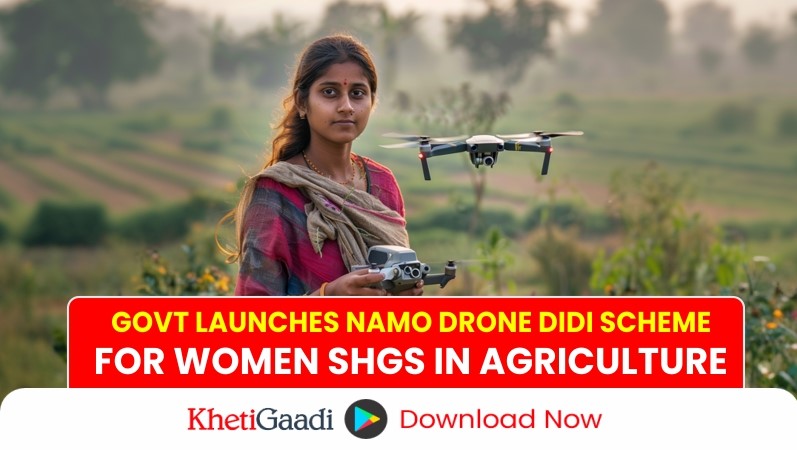In a landmark move aimed at empowering rural women and advancing India’s agricultural sector, the government has launched the “Namo Drone Didi” scheme. With an investment of Rs 1,261 crore, the initiative will provide 14,500 drones to Women Self-Help Groups (SHGs) by 2026. This scheme, operating under the Deendayal Antyodaya Yojana – National Rural Livelihoods Mission (DAY-NRLM), aims to enhance crop management and create sustainable income streams for women in rural areas.
KhetiGaadi always provides right tractor information
Scheme Overview and Objectives
Under the “Namo Drone Didi” scheme, each selected SHG will receive a drone package designed for agricultural services, particularly for spraying liquid fertilizers and pesticides. This central sector initiative also includes comprehensive Operational Guidelines to streamline its rollout and ensure effective use. An Empowered Committee of Secretaries from various ministries—including Agriculture, Rural Development, Fertilizers, Civil Aviation, and Women and Child Development—will oversee the scheme, which aims to boost crop productivity, reduce input costs, and create new livelihood opportunities for rural women.
Financial Structure and Support for SHGs
The scheme’s financial model includes substantial support to make drone procurement feasible for SHGs. The government offers 80% Central Financial Assistance (CFA), covering up to Rs 8 lakh per drone package. SHGs can raise the remaining amount through the Agriculture Infrastructure Financing Facility (AIF), which provides an additional 3% interest subvention, or through other available financing options under Ministry of Rural Development programs.
Each drone package includes the necessary tools for efficient agricultural operations: a spray-enabled drone, camera, battery set, charger hub, carrying box, and essential accessories like spare batteries. The package also comes with a one-year on-site warranty, two years of annual maintenance, insurance, and GST coverage, making it a complete setup for SHGs to launch their drone services.
Training and Capacity Building for Women SHGs
A significant aspect of the Namo Drone Didi scheme is its emphasis on training. Each SHG will train one member as a drone pilot through a 15-day program focused on the agricultural application of nutrients and pesticides. Additionally, a second member, or a family member with a technical inclination, will be trained as a drone assistant to handle maintenance and minor repairs, ensuring seamless operation. The training, conducted by drone manufacturers as part of the package, aligns with government-issued schedules and is designed to build a strong foundation for SHGs to operate drones independently and confidently.
Implementation Strategy and Local Support
Lead Fertilizer Companies (LFCs) will serve as implementing agencies at the state level, working closely with state agricultural departments, drone manufacturers, and SHGs to ensure smooth integration of drone technology in local farming practices. LFCs will handle the procurement of drones through a transparent process, transferring ownership to SHGs individually or through Cluster Level Federations (CLFs) for shared use.
The operational areas will be strategically selected based on agricultural demand, with SHGs expected to cover approximately 2,000 to 2,500 acres annually. State Departments of Agriculture and DAY-NRLM officials will closely monitor the adoption process, offering support to SHGs as they familiarize themselves with this new technology. State Level Committees will manage on-the-ground implementation, providing guidance, logistical support, and helping SHGs build a client base for sustainable income generation.
Real-Time Monitoring via Drone Portal
The scheme introduces an IT-based Management Information System (MIS) known as the Drone Portal to ensure transparency and efficiency. This digital platform will monitor service delivery, track fund disbursements, and provide real-time updates on each drone’s operational use. The Drone Portal will act as a one-stop ecosystem for fund management, service tracking, and data-driven decision-making, allowing stakeholders to oversee the program’s impact closely.
Socio-Economic Impact of the Scheme
The Namo Drone Didi scheme is expected to bring transformative socio-economic benefits, not only empowering women but also integrating advanced technology into India’s agricultural practices. By providing SHGs with drones, the scheme aims to boost crop yields, improve operational efficiency, and lower input costs, benefiting farmers and bolstering rural economies. For rural women, the initiative offers a pathway to sustainable livelihoods, enhancing their role in India’s agrarian landscape.
Stay informed on agricultural innovations and government schemes by following KhetiGaadi’s WhatsApp updates or visiting the KhetiGaadi website regularly.
To know more about tractor price contact to our executive






